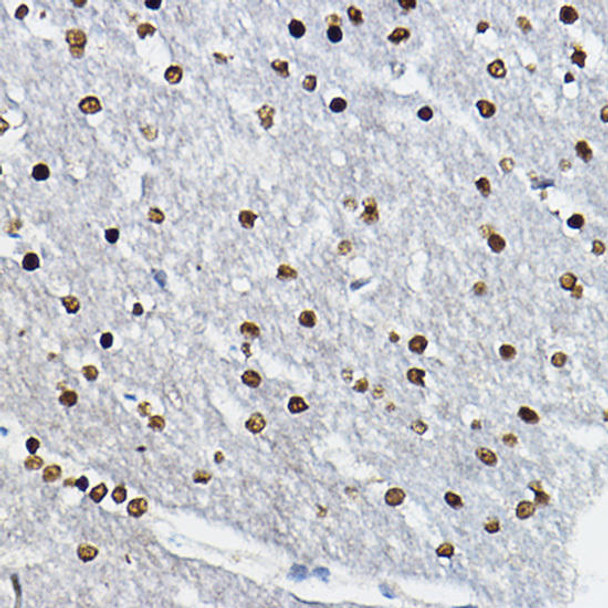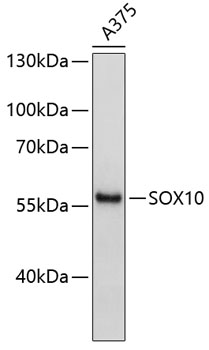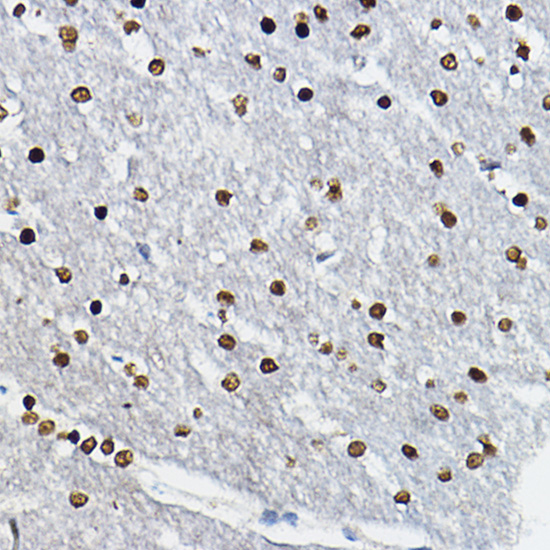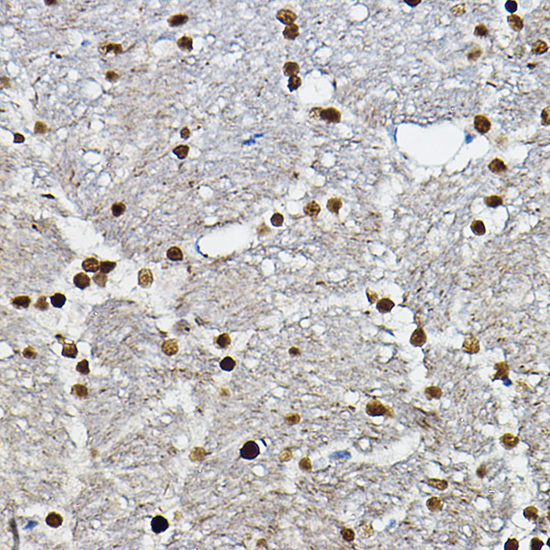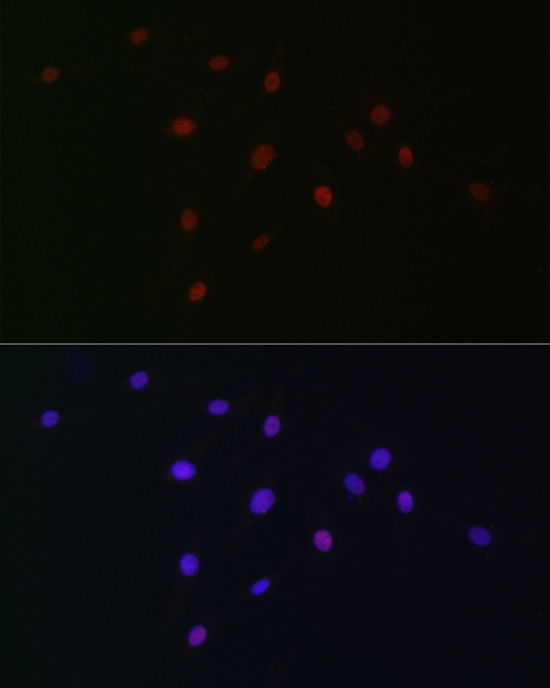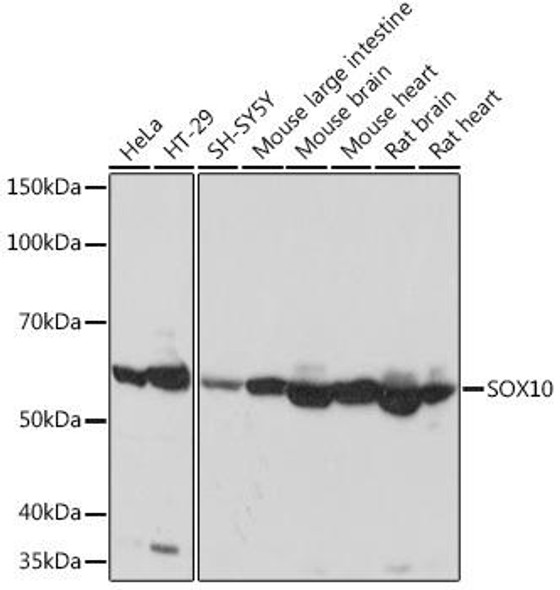Anti-SOX10 Antibody (CAB8635)
- SKU:
- CAB8635
- Product type:
- Antibody
- Application:
- WB
- Application:
- IHC
- Reactivity:
- Human
- Mouse
- Rat
- Host Species:
- Rabbit
- Isotype:
- IgG
- Research Area:
- Epigenetics and Nuclear Signaling
Frequently bought together:
Description
| Antibody Name: | Anti-SOX10 Antibody |
| Antibody SKU: | CAB8635 |
| Antibody Size: | 20uL, 100uL |
| Application: | WB IHC IF |
| Reactivity: | Human, Mouse, Rat |
| Host Species: | Rabbit |
| Immunogen: | A synthetic Peptide of human SOX10 |
| Application: | WB IHC IF |
| Recommended Dilution: | WB 1:500 - 1:1000 IHC 1:50 - 1:50 IF 1:50 - 1:200 |
| Reactivity: | Human, Mouse, Rat |
| Positive Samples: | A375 |
| Immunogen: | A synthetic Peptide of human SOX10 |
| Purification Method: | Affinity purification |
| Storage Buffer: | Store at -20°C. Avoid freeze / thaw cycles. Buffer: PBS with 0.02% sodium azide, 50% glycerol, pH7.3. |
| Isotype: | IgG |
| Sequence: | Email for sequence |
| Gene ID: | 6663 |
| Uniprot: | P56693 |
| Cellular Location: | Cytoplasm, Nucleus |
| Calculated MW: | 31kDa/49kDa |
| Observed MW: | 60kDa |
| Synonyms: | SOX10, DOM, PCWH, WS2E, WS4, WS4C |
| Background: | This gene encodes a member of the SOX (SRY-related HMG-box) family of transcription factors involved in the regulation of embryonic development and in the determination of the cell fate. The encoded protein may act as a transcriptional activator after forming a protein complex with other proteins. This protein acts as a nucleocytoplasmic shuttle protein and is important for neural crest and peripheral nervous system development. Mutations in this gene are associated with Waardenburg-Shah and Waardenburg-Hirschsprung disease. |
| UniProt Protein Function: | SOX10: Transcription factor that seems to function synergistically with the POU domain protein TST-1/OCT6/SCIP. Could confer cell specificity to the function of other transcription factors in developing and mature glia. Defects in SOX10 are the cause of Waardenburg syndrome type 2E (WS2E). WS2 is a genetically heterogeneous, autosomal dominant disorder characterized by sensorineural deafness, pigmentary disturbances, and absence of dystopia canthorum. The frequency of deafness is higher in WS2 than in WS1. Defects in SOX10 are a cause of Waardenburg syndrome type 4C (WS4C); also known as Waardenburg-Shah syndrome. WS4C is characterized by the association of Waardenburg features (depigmentation and deafness) and the absence of enteric ganglia in the distal part of the intestine (Hirschsprung disease). Defects in SOX10 are the cause of peripheral demyelinating neuropathy, central dysmyelinating leukodystrophy, Waardenburg syndrome, and Hirschsprung disease (PCWH); also called neurologic variant of Waardenburg-Shah syndrome. PCWH is a rare, complex and more severe neurocristopathy that includes features of 4 distinct syndromes: peripheral demyelinating neuropathy, central dysmyelinating leukodystrophy, Waardenburg syndrome, and Hirschsprung disease. |
| UniProt Protein Details: | Protein type:Cell development/differentiation; DNA-binding; Transcription factor Chromosomal Location of Human Ortholog: 22q13.1 Cellular Component: nucleoplasm; nucleus Molecular Function:identical protein binding; protein binding; transcription coactivator activity Biological Process: anatomical structure morphogenesis; regulation of transcription from RNA polymerase II promoter Disease: Peripheral Demyelinating Neuropathy, Central Dysmyelination, Waardenburg Syndrome, And Hirschsprung Disease; Waardenburg Syndrome, Type 2e; Waardenburg Syndrome, Type 4c |
| NCBI Summary: | This gene encodes a member of the SOX (SRY-related HMG-box) family of transcription factors involved in the regulation of embryonic development and in the determination of the cell fate. The encoded protein may act as a transcriptional activator after forming a protein complex with other proteins. This protein acts as a nucleocytoplasmic shuttle protein and is important for neural crest and peripheral nervous system development. Mutations in this gene are associated with Waardenburg-Shah and Waardenburg-Hirschsprung disease. [provided by RefSeq, Jul 2008] |
| UniProt Code: | P56693 |
| NCBI GenInfo Identifier: | 5902104 |
| NCBI Gene ID: | 6663 |
| NCBI Accession: | NP_008872.1 |
| UniProt Secondary Accession: | P56693,Q6FHW7, B4DV62, |
| UniProt Related Accession: | P56693 |
| Molecular Weight: | 49911 MW |
| NCBI Full Name: | transcription factor SOX-10 |
| NCBI Synonym Full Names: | SRY-box 10 |
| NCBI Official Symbol: | SOX10 |
| NCBI Official Synonym Symbols: | DOM; WS4; PCWH; WS2E; WS4C |
| NCBI Protein Information: | transcription factor SOX-10 |
| UniProt Protein Name: | Transcription factor SOX-10 |
| Protein Family: | Transcription factor |
| UniProt Gene Name: | SOX10 |

